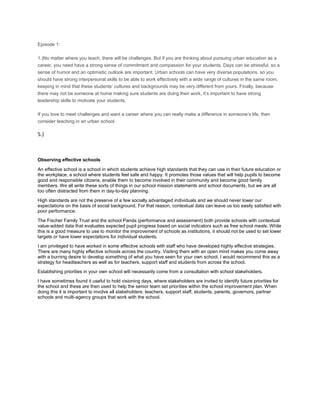Episode 1
- 1. Episode 1: 1.)No matter where you teach, there will be challenges. But if you are thinking about pursuing urban education as a career, you need have a strong sense of commitment and compassion for your students. Days can be stressful, so a sense of humor and an optimistic outlook are important. Urban schools can have very diverse populations, so you should have strong interpersonal skills to be able to work effectively with a wide range of cultures in the same room, keeping in mind that these studentsâ cultures and backgrounds may be very different from yours. Finally, because there may not be someone at home making sure students are doing their work, itâs important to have strong leadership skills to motivate your students. If you love to meet challenges and want a career where you can really make a difference in someoneâs life, then consider teaching in an urban school. 5.) Observing effective schools An effective school is a school in which students achieve high standards that they can use in their future education or the workplace, a school where students feel safe and happy. It promotes those values that will help pupils to become good and responsible citizens, enable them to become involved in their community and become good family members. We all write these sorts of things in our school mission statements and school documents, but we are all too often distracted from them in day-to-day planning. High standards are not the preserve of a few socially advantaged individuals and we should never lower our expectations on the basis of social background. For that reason, contextual data can leave us too easily satisfied with poor performance. The Fischer Family Trust and the school Panda (performance and assessment) both provide schools with contextual value-added data that evaluates expected pupil progress based on social indicators such as free school meals. While this is a good measure to use to monitor the improvement of schools as institutions, it should not be used to set lower targets or have lower expectations for individual students. I am privileged to have worked in some effective schools with staff who have developed highly effective strategies. There are many highly effective schools across the country. Visiting them with an open mind makes you come away with a burning desire to develop something of what you have seen for your own school. I would recommend this as a strategy for headteachers as well as for teachers, support staff and students from across the school. Establishing priorities in your own school will necessarily come from a consultation with school stakeholders. I have sometimes found it useful to hold visioning days, where stakeholders are invited to identify future priorities for the school and these are then used to help the senior team set priorities within the school improvement plan. When doing this it is important to involve all stakeholders: teachers, support staff, students, parents, governors, partner schools and multi-agency groups that work with the school.

